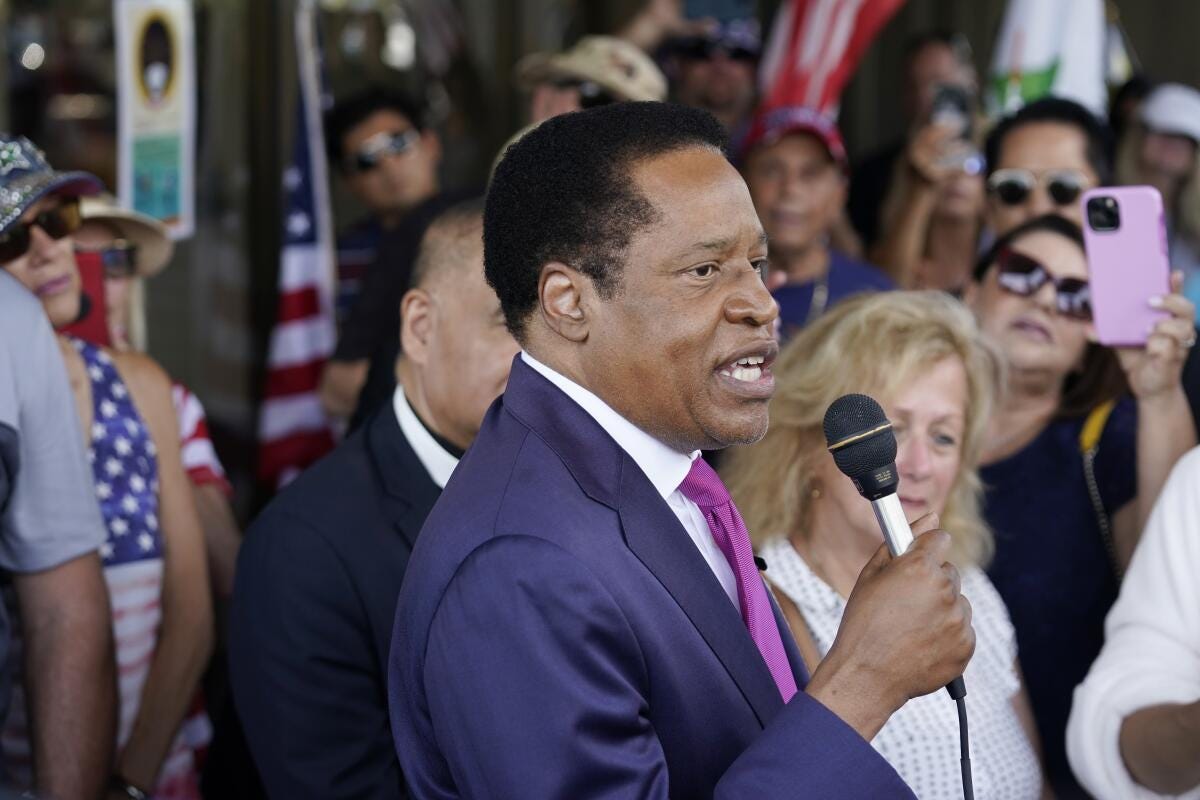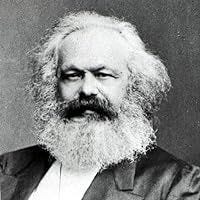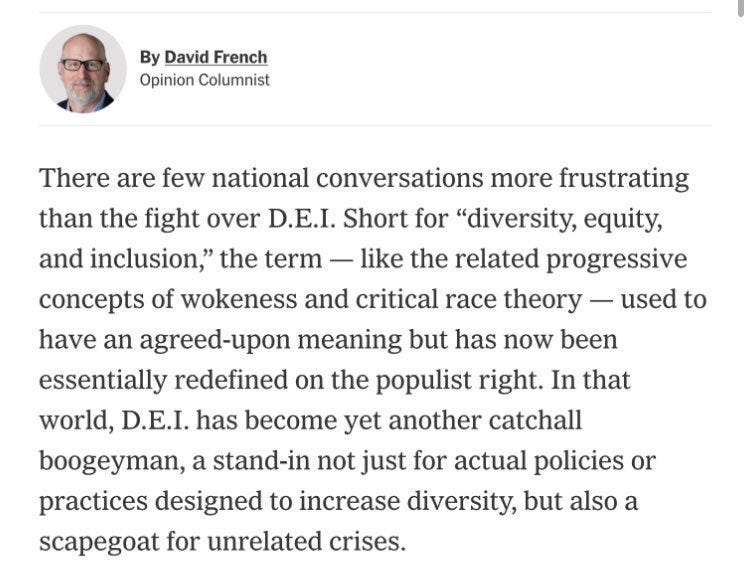DEI and Free Speech -ARE- Theoretically Compatible.
Here's the road to navigating the Leftist-Liberal tensions of Diversity, Equity, and Inclusion (DEI)
Editorial note: This is a guest post by
arguing that it is possible to radically reform DEI such that it could support and bolster free speech and academic freedom, especially on college campuses. To do so, this issue needs to be understood at a Political Theory level as a conflict between Liberalism and Far Left Anti-Liberalism, which has already been explored in the Habermasian tradition. Dr. Nathanial Bork is a Visiting Scholar at Rutgers University working under.In response to the recent DEI-related campus controversies that arose in response to the events of Oct. 7 in Israel, I want to address three recent articles on DEI and lay out how it could be possible for DEI and free speech to co-exist. The three articles I am going to respond to are:
Suzanne Nossel’s ‘DEI and free speech can go hand in hand’,
David French’s ‘This Is the Actual Danger Posed by D.E.I.’, and
Steven Pinker’s ‘A five-point plan to save Harvard from itself.’
Most of my academic in-group finds the idea of DEI and free speech co-existing laughable, and with good reasons, but I am nevertheless going to make the case that Nossel is correct in her conclusion, even if I don’t think her argument gets to the heart of the matter.

To do so, I will attempt to build a valid argument that reaches the same conclusion as her. I will not engage the motte-level of her argument, but will instead get into the messy bailey-level of what needs to be sorted out between free speech and DEI, and explain how the work of Habermas, Discourse Theory, and Public Deliberation Theory gives us the necessary tools to do so.
This builds upon my previous Substacks on Progressive Gatekeeping in Universities, Critical Theory vs. The Liberal Enlightenment, and Nature magazine becoming explicitly partisan, as well as Chapters 5 and 6 of my dissertation.
Suzanne Nossel
To begin, Nossel does a good job listing the harms that have been caused by DEI:
The doctrine is being blamed for corroding elite institutions and stifling the freewheeling discourse that makes college so formative. Harvard’s Danielle Allen, a political scientist who helped lead the university’s 2018 Presidential Task Force on Inclusion and Belonging has acknowledged in an op-ed in The Washington Post that “DEI bureaucracies have been responsible for numerous assaults on common sense” and that Harvard, among others has “stumbled …badly” in part by focusing excessively on accusation rather than cultivating mutual respect.
Further, I agree with her that universities
…should do the hard work of reconciling concerns for diversity and inclusion with the imperative of fostering heterodox thinking among university faculties and political diversity among students, ensuring that the drive for diverse identities does not come at the expense of diverse ideologies.
Where we part ways is that she fails to identify the anti-Liberal roots of many of the theories behind DEI bureaucracies. When she talks about the “noble project of DEI” and lists the real harms of racism, sexism, and other forms of oppression, she seems to assume that these projects came out of well-intentioned Liberal projects in the tradition of the Civil Rights movement.
What that misses, probably unintentionally, is that the authors of the theories behind DEI initiatives openly aren’t looking to improve Western, Liberal democracies; support foundational beliefs such as free speech and open debate; or give everyone an equal voice.
The theories behind DEI initiatives call for a single acceptable narrative with an explicit political goal of liberation via societal transformation, and so even when people from ‘oppressed’ backgrounds are centered, they’re required to stick to that narrative or risk serious backlash for not being “authentic.”
For example, Black Conservatives are accused by Radical Leftwingers of not being politically Black, which happened in spectacural fashion in 2021 when the LA Times accused Larry Elder of being the ‘Black face of white supremacy.’

David French
Like Nossel, French fights from the ‘motte'-level of the argument, arguing that it was the ‘populist right’ was who redefined the terms of the debate. They did do that, but it was only -after- the Critical Theory Left that changed the terms first from their original Liberal definitions.
Down in the bailey, there is real confusion because Critical Theory-based critiques of language have produced a wide array of new and contradictory definitions of key terms in our political debates:
Equity - Liberal equality of opportunity or Leftist equality of outcomes?
Inclusion - Inclusion of people with differing backgrounds or inclusion of people with diverse identities who share the same politics?
Diversity - Diversity of perspectives or diversity of social identities?
French touches on these definitional tensions when he delves into the ‘how’ of these political goals:
To put it simply, the problem with D.E.I. isn’t with diversity, equity, or inclusion — all vital values. The danger posed by D.E.I. resides primarily not in these virtuous ends, but in the unconstitutional means chosen to advance them.
First, he notes that while it’s important to protect marginalized groups from ‘hateful discourse’, that doesn’t justify ‘draconian’ speech codes. Second, he notes the tension between protecting women, supporting survivors of assault on campus especially, and the necessity of due process for the accused.
Finally,
Third, it is urgently necessary to address racial disparities in campus admissions and faculty hiring — but, again, not at the expense of the Constitution. One can agree or disagree with the full extent of the Supreme Court’s holding in Students for Fair Admissions v. Harvard, which halted the use of race as a factor in most college admissions. But it is difficult to ignore the overwhelming evidence that Harvard attempted to achieve greater diversity in part by systematically downranking Asian applicants on subjective grounds, judging them deficient in traits such as “positive personality,” likability, courage, kindness and being “widely respected.” That’s not inclusion; it’s discrimination. (Emphasis my own)
The Constitution is a Liberal Enlightenment document, and it’s defenders need to understand the importance of the boundaries it creates. While Marxists, Critical Theorists, and other Leftists might disdain having to respect these boundaries or argue that they uphold all the systems of oppression (racism, capitalism, sexism, cisheteronormativity, etc.), we’ve now seen the authoritarian consequences of them being allowed to ignore these necessary safeguards.
I also maintain that Rightwing reactionary politics have arisen partly in response to this Leftwing rejection of Liberal norms and values, and I have an academic paper on this that goes into the mechanics of this process, which we hope to have published soon.
Steven Pinker
Steven Pinker has a Five Point Plan to save Harvard in response to all of this:
Free speech.
Universities should adopt a clear and conspicuous policy on academic freedom.
Institutional neutrality.
A university does not need a foreign policy, and it does not need to issue pronouncements on the controversies and events of the day. It is a forum for debate, not a protagonist in debates.
Nonviolence.
Universities should not indulge acts of vandalism, trespassing, and extortion. Free speech does not include a heckler’s veto, which blocks the speech of others.
Viewpoint diversity.
Universities should incentivize departments to diversify their ideologies, and they should find ways of opening up their programs to sanity checks from the world outside.
Disempowering DEI.
Many of the assaults on academic freedom (not to mention common sense) come from a burgeoning bureaucracy that calls itself diversity, equity, and inclusion while enforcing a uniformity of opinion, a hierarchy of victim groups, and the exclusion of freethinkers.
These are all excellent goals, and this call for a return to Liberal values are noble, but it’s essential to remember that the DEI advocates want want revolution and liberation, not this defense of the status quo, and they are absolutely willing to fight for this. Given how many positions they hold in the faculty, administration, and leadership, they wield an enormous amount of power to resist this attempt to undo their work and disrupt their larger political project.
One possible outcome here is an all out brawl and/or slapfight for control of the institutions where either DEI wins and continues to reign, or it loses and is banished forever.
….But! There is a different, Habermasian approach where DEI takes an advisory, not authoritarian, role on campus to reinforce Liberal norms instead of trying to replace them that should at least be explored as a means to achieving these goals.
Which brings us full circle to back into the bailey and my claim that we can have DEI and free speech at the same time. Getting there won’t be simple, and here are five core challenges that will need to be addressed as part of this process. Here’s how:
Recognize that elite power structures have learned to abuse DEI causes to legitimize themselves and further their own goals, making them legitimate targets of Critical Theory.
As progressive Political Theorist Nancy Fraser points out, the embrace of progressive ideas within the corporate-like, neoliberal institutions leads to the values of progressivism becoming hollowed out in service of the revenue production.
DEI is a huge industry that’s successfully captured most of academia and, in recent years, successfully captured much of the corporate world, especially through Environmental, Sustainability, and Growth (ESG) initiatives.
How This Bridges Free Speech and DEI
There’s a place for Leftwing critiques of this new power structure. The DEI bureaucrats didn’t abolish capitalism - they colonized, captured, and subverted it to enrich themselves by exploiting the workers below them in the various hierarchies that are under their control. By cloaking themselves in the moral language of Liberals, they have learned how to deflect any criticism of their power and privilege by accusing whoever would dare challenge of being racist, sexist, trans- or Islamo- phobic, etc.
But, with the firing of Claudine Gay as the President of Harvard, that strategy of commanding control of those below them, all while writing themselves indulgences, no longer works (I.e., this Twitter ratio in response to a post by Ibram X Kendi).
DEI bureaucrats are the power structure now, so all of the exploitation created by the institutions that they control can and should be laid at their feet. In higher education, that makes them responsible for everything from the harm of student debt to the adjunctification of the work force, to the subversion of academic interests to the greater corporate need for new products.
And academics can’t make those critiques of power without free speech.
Recognize that Leftwing worldviews operate as secular religions.
I agree with this Comparative Religions textbook’s definition for -any- religion as the, “human transformation in response to perceived ultimacy.” Marxism, feminism, Critical Theory and its sub-theories, Queer Theory, etc. all operate -as- religions while presenting themselves as secular philosophies.

All of these Leftwing theories contain secularized versions of religious beliefs - Whiteness, capitalism, patriarchy, cisheteronormativity act like geists (spirits) that must be fought by forcing people to confront their non-physical manifestations such as implicit biases, internalized racial and gender norms, etc. To fail to do so is to engage in a form of sin, which is an unacceptable moral violation that has frequently resulted in social annihilation.
How This Bridges Free Speech and DEI
The policy answer for how we can allow for Leftists, Marxists, and Critical Theory activists to engage the public on campus already exists in the policies on how we allow religious activists (Christians, Muslims, etc.) to engage the public on campus.
Religious groups can stand in the public square and preach, and their free speech, even when offensive, is protected. That’s where the Marxist-Critical Theory should be allowed free reign to preach and recruit as well. The limits that apply to Christians and Hindus and Daoists should also apply to them.
Likewise, universities offer courses on the various world religions. Leftwing theories should likewise be offered to be taught in our universities in this same manner.
But neither campus religious groups, nor Leftwing activists groups, should be allowed to convert campuses into temples serving their own cause through colonization of the administration.
Equality of Access to Participation is vital.
As I laid out in my Substack for the Society of Open Inquiry in the Behavioral Sciences, the expulsion of non-Leftists, including many Liberals, has led to constantly increasing levels of blowback from multiple sectors. Even prior to the firing of university presidents in late 2023 and early 2024, there were already major signs of backlash:
Public Perception of Higher Education is in Serious Decline
Conservative lawmakers becoming incentivized to reign in the universities with new regulations and legislation, backed up by threats to funding.
Increasing negative partisanship and polarization
Contributing to a Lack of Cooperation on Collective Action Problems
Encouraging of Conspiratorial Thinking.
According to Gallup, confidence in higher education fell drastically from 2015 to 2023 for all groups. Democrats’ confidence fell 9 points from 68% to 59%, Independents’ confidence fell 16 points from 48% to 32%, and Republicans’ confidence fell 37 points from 56% to 19%.
Meanwhile, according to Education Week, 44 states have taken measures to stop the teaching of CRT, including using legislation, and 18 states have imposed bans.
How This Bridges Free Speech and DEI
The price of eliminating Access of Participation for a group to be included in a public institution is the creation of incentives to destroy that institution and the people who hold power within it.
Institutions must remain neutral, in line with Pinker’s 1st, 2nd, and 4th goals. And that means protecting access, free speech, and academic freedom for people and groups with goals that offend Leftwing activists.
MAGAs, Christians, Conservatives, etc. shouldn’t be able to unduly influence Leftists or drive them out of their jobs or force them to remain silent, and vice versa.
Embracing uncomfortable truths.
Some views are genuinely offensive and hateful, but the problem of unconstitutional ‘hate speech’ codes is that it has grown without restraint. French is right in saying that this urge to control and compel speech and thought is draconian, and the price of not controlling people is that they’re going to say, write, and do research on topics that are going to cause upset and offense.
But universities aren’t daycare centers, and educated adults need to be able to hear things they don’t like. Further, banishing discourse just drives it underground, where it gains more salience.
How This Bridges Free Speech and DEI
But accepting that free speech and academic freedom means that Leftwing views are also protected. Views that arguably denigrate Whites, men, families, religion, etc. deserve the same protection afforded everyone else. Just because a view or fact or argument is offensive, that doesn’t mean it should be silenced.
Entertaining Leftwing critiques without accepting Leftwing solutions.
This is where it becomes possible to have both DEI and free speech. Critiques by anyone should be allowed and protected, but the university must not sacrifice neutrality in order to appease them. Activists across the spectrum need to always be free to express their criticisms, but the university should never impose any activists’ solutions on their opponents or be allowed to use the machinery of the administration to coerce or punish the other side.
How This Bridges Free Speech and DEI
DEI can improve Liberalism, even if it was designed to undermine and destroy it. Habermas’s work in ‘Between Facts and Norms’ lays out how to adapt policies in response to criticism within the bounds that Liberalism requires. That means no using the bureaucracy to impose one’s political will against their opponents, whether it be Leftwing academics intimidating Conservative students or Conservative legislatures banning Critical Theories from being taught.
This is the core of what the university -should- be about - Intellectual Humility and the relentless possibility that we might be wrong. DEI, to the degree that it does good, opens the door for individuals from disadvantaged groups to create and challenge arguments. Further, they are frequently correct when noticing unfair practices in the system. Injustice and oppression are bad things, and the DEI folx can and do make the world better by pointing out where they manifest.
But Liberalism requires them to not be allowed to seize control of our institutions in order to carry out their programs. This has all too frequently led to disasters and harms, including for the people DEI is supposed to serve.
As David French said, “Virtuous goals should not be accomplished by illiberal means.”





